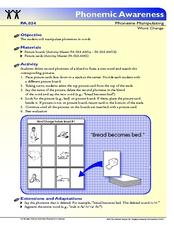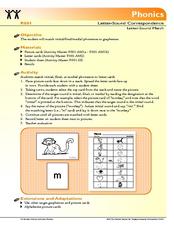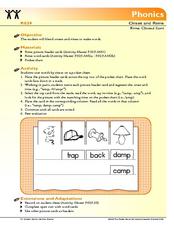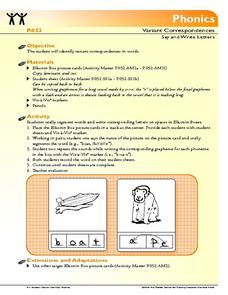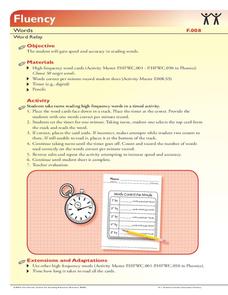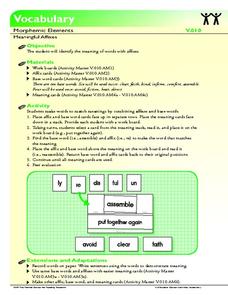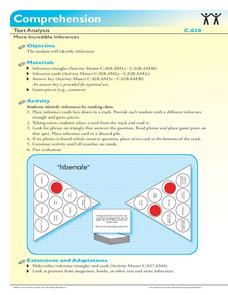Florida Center for Reading Research
Phonological Awareness: Phoneme Manipulating, Word Change
Once your scholars know their letter sounds and recognize them in words, have them try making new words by manipulating phonemes. Pupils are given a word change picture board and a stack of word pictures. They pick a card and place it...
Florida Center for Reading Research
Drop and Say
This neat idea gets kids to use phonics and puzzle-solving skills. Pairs take turns picking picture cards from a pile, say the name of the object on the card, drop a letter to turn that word into a new word, then look for the new word on...
Florida Center for Reading Research
Phonological Awareness: Phoneme Matching, Final Phoneme Pie
Words are interesting things—you can change them by adding or subtracting phonemes. Here, emergent readers change the pictures on their phoneme pie by removing or adding various final phonemes. A fun way to build phonetic competency!
Florida Center for Reading Research
Phonics: Letter-Sound Correspondence, Letter Sound Match
Scholars match initial, medial, and final phonemes to individual graphemes. They pick a card, say its name, then find the letter that makes that sound. If the card is a monkey, the learner finds the letter m, matching the grapheme to the...
Florida Center for Reading Research
Phonics: Onset and Rime, Rime Closed Sort
Practice onset and rime with this word sort activity. Beginning readers lay out the four picture cards along the top of the chart: fan, cap, tack, and lamp. Then, they flip word cards and sort them beneath the image with the same rime....
Florida Center for Reading Research
Phonics: Onset and Rime, Word Swat
With a fly swatter in hand, learners swat the rime-flys with their onset swatter to make, read, and write words by blending the onset with the rime-fly. Scholars blend words, make and write words, and also work to determine if the words...
Florida Center for Reading Research
Phonics: Encoding and Decoding, A Digraph A Word
Learners view a series of images, then choose digraphs, consonants, and vowels to spell out the object's name on each card.
Florida Center for Reading Research
Phonics: Varient Correspondances, Silent "e" Changes
Engage early readers in a silent e activity to help them understand the changes the letter can make to a simple word. With the provided cards, learners read and write each word as it appears without the silent e. Then they read and write...
Florida Center for Reading Research
Phonics: Variant Correspondences, Say and Write Letters
Scholars sound out and write twelve different words. Using Elkonin boxes, pupils say the name of each picture, then write the letters that make each sound.
Florida Center for Reading Research
Fluency: Words, Word Relay
Peers take turns timing each other for one minute and reading as many high-frequency cards as possible.
Florida Center for Reading Research
Vocabulary: Morphic Elements, Compound Word Trivia
Engage young learners in expanding their vocabulary with a fun game. Scholars learn how compound words provide clues about the meaning of unfamiliar vocabulary. Pairs take turns reading a definition, locating its corresponding compound...
Florida Center for Reading Research
Vocabulary: Word Meaning, Undercover Meanings
Support young scholars with studying new vocabulary using this foldable resource. By cutting and folding the included template, learners can record definitions, examples, and a sentence for four different words.
Florida Center for Reading Research
Comprehension: Monitoring for Understanding, Simple Summary
Can your class sum up a text in a few sentences? Help them build this skill by starting nice and slow. For this summarizing activity, the teacher marks the main ideas with sticky notes. Learners read and reread the text, pausing at the...
Florida Center for Reading Research
Fact Versus Opinion
Is that a fact or an opinion? Learners explore the difference using this pocket chart activity during which partners read statement cards and determine whether they are facts or opinions.
Florida Center for Reading Research
Vocabulary: Morphemic Elements, Meaningful Affixes
Invite learners to determine which affix and base word combinations create new words. This activity allows pupils to play around and create words that match specific meanings.
New York City Department of Education
Geography and Early Peoples of the Western Hemisphere
Young historians discover the early people of the western hemisphere. The unit explores how the land changed, how it was used and homes of early Americans such as Incas, Mayans, Inuits, Aztecs, and Pueblos. Individuals also examine these...
Florida Center for Reading Research
Comprehension: Text Analysis, More Incredible Inferences
Reinforce inference skills with a learning game! Scholars read scenarios on cards and match them to a written inference on the triangle. The first pupil to match all their inferences wins!
University of Delaware
Constructing Text-Based Arguments About Social Issues
Eighth graders take a stand on a variety of controversial topics with a lesson on argumentative writing. As they view an informative presentation and work with collaborative groups, they decide which side of each argument they want to...
Florida Center for Reading Research
Advanced Phonics: Syllable Patterns, Syllable Game
A game designed to support advanced phonics instruction challenges scholars to read and break a word into syllables. If the player is correct, they move their game piece forward on the board. Whoever gets to the end first wins!
Florida Center for Reading Research
Comprehension: Text Analysis, Fiction and Nonfiction Find
Scholars analyze fiction and nonfiction text and fill in a worksheet detailing the text's title, genre, and reason for its classification.
Florida Center for Reading Research
Vocabulary: Word Meaning, Dictionary Cube
Scholars work together to define words and answer questions using a dictionary cube.
Florida Center for Reading Research
Phonics: High Frequency Words, Sand Paper Words
Learners use a stack of words embellished with tactile elements, such as sandpaper, to practice high-frequency words. Pupils trace the tactile surface of each letter in the word, write it on their paper, then find and glue that word from...
Florida Center for Reading Research
Vocabulary: Word Meaning, Dictionary Digs
Young scholars dig through dictionaries to uncover the wealth of information they provide. Using the included graphic organizer, children learn about target words by finding their parts of speech, pronunciation, definition, synonyms, and...
NET Foundation for Television
1850-1874 African American Settlers
Go West, young man! Scholars investigate the impact of African American settlers moving to the Nebraska territory, following the passage of the Kansas-Nebraska Act in the mid 1800s. Using primary sources, timelines, maps, and...


